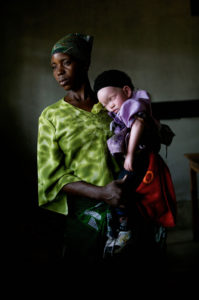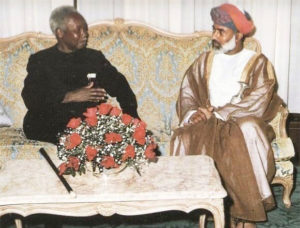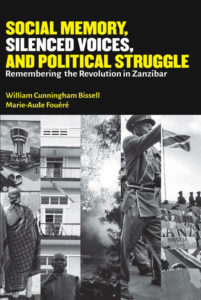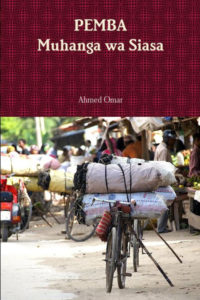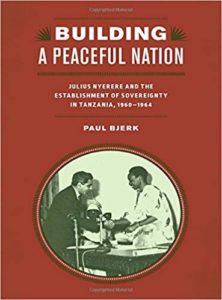Edited by Donovan McGrath
‘We are not ghosts’ – Tanzania’s people with albinism turn the lens on their lives
(Guardian online -UK) Used to fear, abandonment, even attack, a group of young people in a remote rural community are learning that photography can tell their stories and give them a place in society. Extract continues: Film-maker Harry Freedland, who took [a] portrait of Siwema Selestine and her daughter in Tanzania, set up Standing Voice in 2013 after making In the Shadow of the Sun, which follows two Tanzanian men with albinism and documents the discrimination and escalating violence against people with the condition. Albinism is a rare genetic condition that stops the body producing melanin. It is widely misunderstood in some countries where strikingly pale skin can trigger fear, stigmatisation and even attack. Some believe the body parts of people with albinism change fortunes when used in witchcraft. Ukerewe, an island on Lake Victoria, Tanzania, is home to 350,000 people. Discrimination against people with albinism has been strong there. Globally, albinism affects one in 18,000 people; in Tanzania, it is seven times more prevalent… Albinism affects the skin, hair and eyes, causing low vision and susceptibility to skin cancer. Poor eyesight can be misinterpreted as lack of ability: many with the condition leave school without qualifications and have to take on menial work outside. Africans with albinism often die painful deaths from skin cancer at a young age because of exposure to the sun… (29 September 2019)
Tanzanian court upholds a law banning child marriage
(CNN online – USA) Extract: … A high court ruling in 2016 had declared “unconstitutional” sections of Tanzania’s marriage act that allowed the practice. It also directed the government to raise the legal age of marriage to 18 years within a year. That judgement followed a legal challenge by children’s rights activists, who argued that the existing law had pushed many girls into underage marriages. But Tanzania’s attorney general launched an appeal – one of its claims was that child marriage could protect unmarried girls who get pregnant. The Supreme Court of Appeal dismissed the attorney general’s appeal … With two out of five girls being married off before their 18th birthday, Tanzania has one of the highest rates of child marriage in the world … (23 October 2019)
US man drowns while proposing marriage to his girlfriend in Tanzania
(Guardian online – UK) Extract: A woman has paid a heart-breaking tribute to her boyfriend, who drowned while proposing marriage to her in Tanzania. Kenesha Antoine posted a video on Facebook of her boyfriend, Steven Weber, swimming up to the window of their underwater room at the Manta Resort on Pemba Island, off Tanzania. “I can’t hold my breath long enough to tell you everything I love about you. But everything I love about you I love more every day”! the note reads. In the video, the Louisiana man flips the page to show the message “Will you marry me?” before pulling out an engagement ring box. Antoine posted on Facebook that Weber “never emerged from those depths”. “You never got to hear my answer, ‘Yes! Yes! A million times, yes’. We never got to embrace and celebrate the beginning of the rest of our lives together, as the best day of our lives turned into the worst, in the cruellest twist of fate imaginable… “Wherever in the universe Steven’s spirit now resides … he’s probably entertaining someone with a story about how he royally screwed up that proposal and died while being extra.” The Manta Resort confirmed in a statement that a guest had died… (22 September 2019)
US says man can bring back ‘skin, skull, teeth and claws’ of hunted Tanzania lion
(Guardian online – UK) Extract: The Trump administration has authorised a Florida man to bring back the “skin, skull, teeth and claws” of a lion he hunted in Tanzania, granting the first permit to import a lion from that country since the species gained protection under the US Endangered Species Act. Environmental organizations say the move could open the floodgates for importing other endangered species such as lions and rhinos. A freedom of information request made public by the US Fish and Wildlife Services (FWS) also revealed that the hunter, Carl Atkinson, was represented by lawyer John Jackson III, who is also a member of the Trump administration’s International Wildlife Conservation Council, a controversial advisory board that promotes trophy hunting… “It signals that the administration is ready to approve, trophy imports from Tanzania despite that country’s history of wildlife mismanagement,” [said Tanya Sanerib, the international legal director for the Center for Biological Diversity]. Under the Obama administration, the import of elephant trophies from Tanzania were banned … Under Trump, the FWS reversed course and decided to instead evaluate applications to import elephant and lion trophies from all countries on a case-by-case basis… In a statement, FWS simply reiterated that “legal, well-regulated hunting” can help fund and promote wildlife conservation… [T]he department indicated that it would issue a permit to a Michigan hunter to import the skin, skull and horns from a critically endangered black rhinoceros killed in Namibia. (15 September 2019)
Tanzania Is Pressing Burundi Refugees to Leave, Says Report
(New York Times online – USA) Extract: … Human Rights Watch says tens of thousands of Burundian refugees face mounting pressure to involuntarily leave Tanzania amid efforts by authorities there to reduce the number of Burundians in the country. The rights group in a statement… charged that the fear of violence, arrest and deportation from Tanzania is driving many of the 163,000 Burundians out of the country. Burundi fell into instability in 2015 after President Pierre Nkurunziza announced he would seek a disputed third term. The election was marked by violence and allegations of rigging. Nearly 350,000 of Burundi’s 11 million people fled. Tanzanian authorities have expressed frustration over what they say is the U.N.’s slow pace in repatriating refugees back to Burundi… (12 December 2019)
U.N. Report Bolsters Theory That Hammarskjold Plane Was Downed
(New York Times online – USA) Extract: A prominent jurist investigating the mysterious 1961 plane crash that killed the United Nations secretary general, Dag Hammarskjold, in southern Africa has concluded that the aircraft may have been attacked, and that four nations – Britain, Russia, South Africa and the United States – may be withholding information that could solve the puzzle. The jurist, Mohamed Chande Othman, a former chief justice of Tanzania, issued the conclusions in a 95-page report … posted on the website of the United Nations … Mr. Hammarskjold, a 56-year-old Swedish diplomat considered one of the most successful leaders of the United Nations, was on a mission to help settle a secessionist war in newly independent Congo, a former Belgian colony. His chartered aircraft, a DC-6, went down after midnight on Sept. 18, 1961, moments before its scheduled landing in Ndola, a town in what was then the British protectorate of Northern Rhodesia and is now Zambia. Fifteen people aboard, including Mr. Hammarskjold, members of his staff and crew, were killed in the crash. The sole survivor, an American security officer named Harold Julien, died of injuries six days later… Mr. Hammarskjold has been exalted as a model international statesman. He is the only person to have been posthumously awarded the Nobel Peace Prize… Initial investigations by the colonial authorities attributed the crash to pilot error, but suspicions of foul play multiplied in later years. Some theories hold that colonial-era mining interests, perhaps backed by Western intelligence agencies, had plotted to assassinate Mr. Hammarskjold, who was an avid promoter of African independence from colonial powers during the pivotal period of the Cold War. Other provocative bits of information appear to corroborate a theory that South African or Belgian mercenaries may have forced Mr. Hammarskjold’s plane to crash. But the evidence is far from conclusive… (31 October 2019)
Tanzanian Idris Sultan ‘held’ for Magufuli face-swap
(BBC News online – UK) Extract: Popular Tanzanian comedian Idris Sultan is being held by police after sharing face-swap photos of himself and President John Magufuli, his lawyer says. Extract continues: His lawyer said he was being held under the controversial Cybercrimes Act, which forbids using a computer system to “impersonate” someone else. If charged and convicted, he could face up to seven years in prison… Sultan, the one-time winner of Big Brother Africa, shared two photos on his social media accounts which have more than five million followers. One of the pictures shows Sultan posing on a presidential chair with the national seal, while the other shows Mr Magufuli’s face on the comedian’s body. The caption was in Swahili and read: “We swapped roles for a day so that he could enjoy his birthday in peace.” Shortly after the photos were posted, an Instagram comment, thought to be from Paul Makonda, the Regional Commissioner for Dar es Salaam, told Sultan to report to any police station in the city for further instructions, adding that he “doesn’t know the boundaries of his work.” A relative told the BBC that Sultan had turned himself in … The 2015 Cybercrimes Act has been criticised by human rights activists, who say it infringes on freedom of expression. Sultan is the second high-profile celebrity to run into trouble with the government. Top African performer Diamond Platnumz was barred from performing in Tanzania last year for “behaving indecently.” … There is a “shrinking space for freedom of expression” in Tanzania, according to Human Rights Watch and Amnesty International… (31 October 2019)
‘Tell us the right PIN or you’re dead’: Terrified couple are abducted by four men inside a fake taxi after touching down in Tanzania for a holiday
(Daily Mail online – UK) Extract: A couple has recalled the frightening ordeal of being abducted and robbed by four men in a ‘taxi’ moments after arriving in a large city in Tanzania. Chris Williams and partner Tiffany Zyp from New Zealand’s North Island [were] on the overseas adventure of a lifetime. The pair [were] driven around the city to various ATMs – withdrawing a total of $4200 at the demand of their kidnappers. They were also robbed of the $500 cash they had on them and their phones in the terrifying two-hour ordeal … The couple, both aged 31, had just arrived by bus in the eastern port city of Dar es Salaam and were looking for a taxi to drive them to Zambia for the next leg of their adventure, the New Zealand Herald reported. They decided to take a taxi after striking up a friendly conversation with a driver. They were joined by three other men once inside the taxi, who pinned the couple in the back seat and threatened them… The men eventually released the couple, handing back their passports and empty wallets, and told them to ‘act normal when you leave or our friends will get you.’ … One man has reportedly … been arrested and released on bail. (21 August 2019)
Duke’s hidden talent! Prince William leaves a Tanzanian boy ‘gobsmacked’ by speaking to him confidently in Swahili in a ‘truly special moment’ at the Princess Diana Legacy Awards
(Daily Mail online – UK) Extract: … The Duke of Cambridge, 37, was meeting 20 recipients of Princess Diana’s Legacy awards for tea at Kensington Palace when he shocked Erick Venant, 25, from Tanzania, by speaking to him in Swahili… [Tessy Ojo, Chief executive of the Diana Award charity] told People magazine: ‘One of the young people is from Tanzania, and he started talking to him in Swahili… It wasn’t just one sentence. This was not something he had just read out of a book.’ … Erick was among a group of Legacy Award recipients, from across the UK and Commonwealth countries including Canada, Nigeria, Tanzania and India, who have had a significant impact on society. He was awarded after leading a nationwide anti-microbial resistance campaign in 23 administrative regions of Tanzania, which educated over 49,000 students and teachers in 114 secondary schools… It’s not the first time the royal has revealed his talents as a linguist, after speaking Swahili to Tanzanian President John Magufuli while on a trip last year… While he is not believed to be fluent, Prince William taught himself Swahili during his time at university… The royal is believed to speak five languages in total, including French, Welsh, Gaelic and a little Spanish.
(28 November 2019)
Deeds and Misdeeds: Land Tilting and Women’s Rights in Tanzania
(New Left Review 118 – UK) Extract: Conflicts over land are on the rise in Tanzania. Almost daily, the news headlines announce five deaths here, two more there, on account of land-use struggles. Spokespeople for the ruling CCM party explain that this is just a temporary phenomenon, as their programme of land tilting unfolds; once boundaries have been demarcated and rights of occupancy formally registered, the conflicts will disappear… Though Tanzania has several big cities—in addition to Dar es Salaam, now a sprawling conurbation of almost 5 million, and Mwanza, the bustling port on Lake Victoria, the provincial hubs of Arusha, Mbeya, Morogoro and Tanga all have populations of over a quarter of a million—70 per cent of its citizens are rural, mostly poor subsistence farmers, living in some 12,000 villages across the vast country. Land issues, here as in many other parts of Africa, are a burning political-economic question… Tanzania is the largest country in its region. It has a population of 57 million … Since the liberalization of the economy, investment and growth – telecoms, tourism, construction— have been concentrated in the cities, in conservation areas (national parks, game reserves, etc.), and along the coast, creating disparities of growth. Nevertheless, tensions have so far largely been managed by CCM. The rise of land conflicts signals a worrying development, raising questions about the country’s approach to land formalization. This article draws on field research in different parts of Tanzania … our team … investigated tilting in some forty villages, assessing the certification data in the land registries of different districts… Tanzania is a slow adopter of land-formalization policies… In addition to kick-starting agrarian capitalism, a stated objective of the land-tilting programme … was to improve women’s rights… With Anna Tibaijuka’s tenure as CCM Minister for Lands from 2010, formalization found a female champion… [S]he promoted [the Peruvian econom ist Hernando] de Soto’s line: untitled land was ‘dead capital’… [T]itle deeds would reduce conflicts over land, as well as providing collateral for loans… [S]he reminded Tanzanians that tilting included the duty to pay land rents, fees and fines as dictated by the law … The donor-backed formalization programmes in Tanzania focus on issuing ‘certificates of customary rights of occupancy’ (ccros) for village land… The ccros have been explicitly designed for the mass of poorer farmers … Yet progress has been slow… Official estimates are that only 3 per cent of Tanzania’s rural land parcels have been conclusively titled to date. The outcomes—especially for women, the poor and other vulnerable groups such as pastoralists and huntergatherers—have been problematic… The process of mapping Western— or, more accurately, us-based—household models and ownership patterns onto the mosaic of Tanzanian kinship structures and local land-management systems has proven more than a little complicated…
(July/August 2019) Thanks to Jerry Jones for this item—Editor

